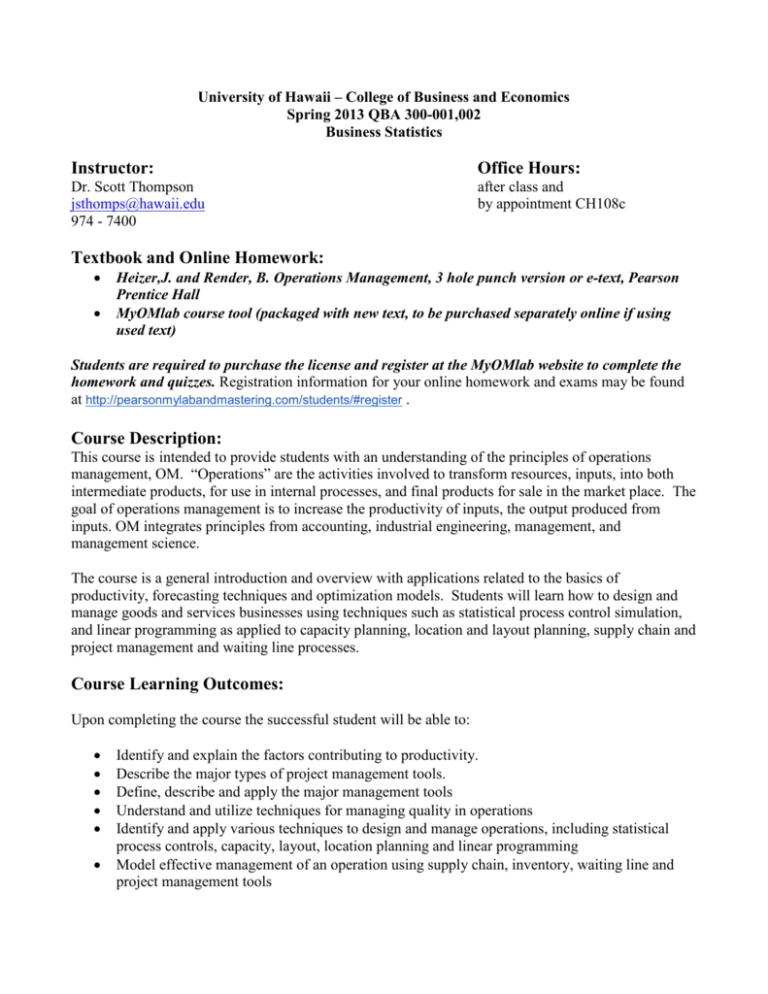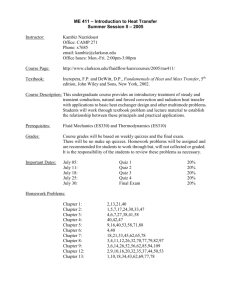
University of Hawaii – College of Business and Economics
Spring 2013 QBA 300-001,002
Business Statistics
Instructor:
Office Hours:
Dr. Scott Thompson
jsthomps@hawaii.edu
974 - 7400
after class and
by appointment CH108c
Textbook and Online Homework:
•
•
Heizer,J. and Render, B. Operations Management, 3 hole punch version or e-text, Pearson
Prentice Hall
MyOMlab course tool (packaged with new text, to be purchased separately online if using
used text)
Students are required to purchase the license and register at the MyOMlab website to complete the
homework and quizzes. Registration information for your online homework and exams may be found
at http://pearsonmylabandmastering.com/students/#register .
Course Description:
This course is intended to provide students with an understanding of the principles of operations
management, OM. “Operations” are the activities involved to transform resources, inputs, into both
intermediate products, for use in internal processes, and final products for sale in the market place. The
goal of operations management is to increase the productivity of inputs, the output produced from
inputs. OM integrates principles from accounting, industrial engineering, management, and
management science.
The course is a general introduction and overview with applications related to the basics of
productivity, forecasting techniques and optimization models. Students will learn how to design and
manage goods and services businesses using techniques such as statistical process control simulation,
and linear programming as applied to capacity planning, location and layout planning, supply chain and
project management and waiting line processes.
Course Learning Outcomes:
Upon completing the course the successful student will be able to:
•
•
•
•
•
•
Identify and explain the factors contributing to productivity.
Describe the major types of project management tools.
Define, describe and apply the major management tools
Understand and utilize techniques for managing quality in operations
Identify and apply various techniques to design and manage operations, including statistical
process controls, capacity, layout, location planning and linear programming
Model effective management of an operation using supply chain, inventory, waiting line and
project management tools
Course Policies:
Email is not a substitute for class attendance or office hours. Email requests for information
made available in class or on this syllabus will only be honored in exceptional circumstances. (class
absence, in general, is not considered exceptional).
Academic Dishonesty Policy
Academic dishonesty includes representing the work of another as one's own or cheating by any
means. Academic dishonesty also includes aiding, abetting, concealing, or attempting such activity.
The usual penalty is an F in the course and disciplinary action by the University.
Documented Disabilities
Any student with a documented disability who would like to request accommodations should
contact the University Disability Services Office - Hale Kauanoe A Wing Lounge, 933-0816 (V),
933-3334 (TTY), shirachi@hawaii.edu - as early in the semester as possible.
Course Grading:
•
•
•
On-line homework = 20%
Unit Test (2 @ 25% each) = 50%
Final exam = 30%
Homework and Quizzes
Homework and quiz assignments will be completed using the online course tool called
MyOMlab. Homework assignments are not timed but are recorded upon submittal. Your
score on the homework is not part of your final grade. The timely completion of the
homework, during its assignment period, is a very important part of the learning process.
Indeed you are a producer of knowledge and the homework is part of the production
process. Statistical studies of UH business students clearly show that students who take the
time to understand the homework problems and do the homework in a timely manner do
significantly better on the class quizzes and exams (which do determine your grade).
Quizzes are to be taken after the completion of the homework and are timed, 30 minutes,
and are multiple choice questions about the conceptual material in the assigned reading. In
general you will not be asked to do extensive numerical calculations on the quizzes. There
are 10 quizzes covering the chapters and modules assigned.
Tri TermTests
Three, in-class, tests will be given. Students must use Excel and may not use any other
online tools or the textbook. Students are expected to read the chapters in the textbook.
Test questions may come from material presented in the textbook and in the class lectures.
Final Exam
The final exam is cumulative (covering all material from the course). See schedule below.
Grading Policy and Grade Guidelines:
The grade scale table below represents a guideline for each letter grade for this course. Please keep in
mind that students earn their grades while faculty simply report and record them. Grades will be based
on a cluster analysis which insures that each student’s letter grade is more like other students receiving
this letter grade than the group of students receiving a higher grade. In statistics terms this means that
your letter grade is not significantly different than the other students who also received this grade and
your grade is significantly different than the grade received by other students. In this sense the grades
are fair. Therefore, keep in mind that questions (such as those that follow) will not be effective in
changing your assigned grade.
•
•
•
“My attendance was perfect, can you make an exception this once?”
“Is there any extra credit I can do to raise my grade?”
“I am going to lose my financial aid, can you make an exception in this case?”
Grade
Percentage
A
92% - 100%
A-
90% - 91.99%
B+
88% - 89.99%
B
82% - 87.99%
B-
80% - 81.99%
C+
78% - 79.99%
C
72% - 77.99%
C-
70% - 71.99%
D
60% - 69.99%
F
< 60%
Operations Management 300 Planned Schedule
(subject to revisions, to be announced in class):
Week
Beginning
1/7/2013
Homework
and Class
Problems
Chapter 1
Chapter 1
Module B
Module B
Chapter 4
Chapter 4
Specific Test and Quiz
Due Dates will be
announced in class
2/11/2013
2/18/2013
2/18/2013
2/25/2013
3/4/2013
Course Content and Reading Requirements
Chapter 1: Operations and Productivity
Chapter 2: Operations Strategy in a Global Environment
Module B Linear Programming
Module B Linear Programming, Chapter 4
Holiday: Martin Luther King Day (M)
Chapter 4: Forecasting
Chapter 6, 6s: Managing Quality and Statistical Process
Control
Chapter 7, 7s: Process Strategy, Capacity and Constraint
Management
Chapter 9: Layout Strategies
Holiday: President’s Day(M)
Module D Waiting Line Models
Chapter 8: Location Strategies
3/11/2013
3/18/2013
3/25/2013
4/1/2013
4/8/2013
Chapter 11,12: Supply Chain and Inventory Management
Chapter 12: Inventory Management
Spring Recess
Module F Simulation
Module F Simulation
Chapter 11
Chapter 12
4/15/2013
4/22/2013
4/29/2013
5/6/2013
Module F Simulation
Chapter 3: Project Management
Chapter 3: Project Management
Final Exam, 2:00 - 4:00 PM in classroom
Module F
Chapter 3
Chapter 3
X. Ch. 3 Quiz
Ch 1,3,4,6s,7s,8,9,12, Modules B,D,F
1/14/2013
1/21/2013
1/21/2013
1/28/2013
2/4/2013
Practice Quiz
I. Module B Quiz
Chapter 6s
II. Ch. 4 Quiz
Exam 1, Chapters 1,4
and Module B
Chapter 7s
Chapter 9
III. Ch. 6 Quiz
IV. Ch. 7 Quiz
Module D
Chapter 8
V. Ch. 9 Quiz
VI. Ch. 8 Quiz
Exam 2, Chapters
6s,7s,8.9
VII. Ch. 11 Quiz
Module F
Module F
VIII. Ch. 12 Quiz
IX. Mod F Quiz
Exam 3, Chapter 12
Modules D and F





